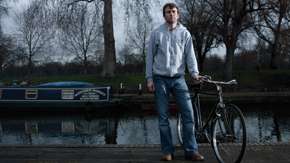Members of the 2008 Deep South tour riding through the Devon mud on their way to Totnes
For many, cycling and theatre may not be the most obvious of pairings, but when it comes to spreading a message of sustainable living it's proving a potent combination.
The Otesha Project UK, a set-up dedicated to inspiring others to live more sustainably, organises cycle tours, with young people traveling the UK, learning about low-impact living and inspiring others through theatre and workshops as they go.
The idea is that the tours not only impact on audiences, but also on those doing the pedalling. And with Liz McDowell at the helm, things look set to step up a gear, too.
Otesha, explains McDowell, actually began in Canada in 2003, founded by Jessica Lax and Jocelyne Land-Murphy, who met on a university field trip to Kenya. During their time in Africa, the friends became increasingly aware of their environmental impact, the amount of water they were all using for example. ‘They got a bit uncomfortable with their consumptive lifestyles,' says McDowell. ‘They then returned to Canada and thought: "Okay, well we should do something positive about this".'
Cycling the talk
That 'something positive' started with storytelling and developed into a theatrical performance, focussing on choices we can make in order to have a more positive impact - what we eat and how we travel, for example.
They then announced they planned to tour with the performance and around 30 others joined them for the ride - literally. ‘Neither of them were particularly big cyclists,' says McDowell. ‘But they thought: "If we're really going to walk the talk and travel sustainably, we should do it by bike".' They cycled across the country in six months, visiting 12,000 people at schools and community events.' Otesha was born.
It was actually author and 'social activist' Michael Norton OBE - who remains on the advisory group - who decided the UK could do with a dollop of Otesha action too. ‘He'd met the founders and thought it was a great idea,' explains McDowell. ‘So he went out and got funding and brought together a group of young people to be the Board of Trustees.' They were then looking for someone to ‘bring it to life' and she landed the job.
Originally from Canada herself, McDowell knew a few people who'd been on Otesha tours so ‘had the sense that it was a really cool project'. After graduating she'd worked for a non-profit, then completed a fellowship at the UN focussing on climate change adaptation, before joining Otesha in May 2007.
What do you think? Comment here
That December, she and the trustees did a test cycle tour, free-wheeling for five days, taking in the Big Green Gathering festival and trialing part of Otesha Canada's play at a youth club in Bristol. It was a success - this year will see a team of 18 embarking on what will be Otesha's sixth cycle tour, travelling from Land's End to John O'Groats in eight weeks, stopping at schools, youth clubs, festivals and communities and reaching up to 2000 people.
The evolving play
The Otesha play lasts up to one hour and is performed for audiences of varying ages, including kids as young as five. Consisting of a series of scenes, each focussing on a different theme, it covers social as well as environmental issues. The 'fashion' theme for example, covers issues such as sweatshops, organic textile production and the amount of clothing going to landfill, the 'food' theme issues include food miles and healthy eating while the 'water' theme tackles embedded water and the impact of buying bottled.
While the themes remain a constant, the play is also continually evolving. Each new tour team is handed the script the previous one ended with and can then do with it what they will. 'They just have to keep the key ethos the same - so it's fun, lighthearted and about stuff you can do in your day-to-day life that has an impact.'
McDowell believes that targeting young audiences with such messages is really important. 'There are really big scary global issues, including climate change and poverty, and then there are individuals feeling like it's really overwhelming - they don't know what to do,' she explains.
‘Young people - we're not politicians, we don't own businesses, we don't have that much power, so it's about looking at a way of communicating things that you can do. Things that, if done with others, will make an impact.'
The ripple effect
So how does Otesha measure that impact? They use a 'bull's eye' approach, she explains:
'There are three rings; the outer ring is everyone that we reach on cycle tours - thousands of people who maybe have a bit more awareness about the issues and care a bit more too. Then there's the middle ring, approximately one in ten people we reach, who actually do something different. Then there's the inner ring, young people we work with really intensely - tour members for example - who start incorporating sustainability into everything they do. As we've gone on we've realised that is the most important thing that we do.' Such people, she says, can cause a real 'ripple effect'.
Of course it helps if they're keen to make a difference in the first place, as many tour members are. Open to 18 - 28 year olds, the trips attract a real mix - some are students, some are on sabbaticals, some are interested in environmental education, cycling or theatre, others simply want to learn more about sustainability.
Each participant is set a fundraising goal - this year it's £1000 - and applicants must go through an interview process to ensure they ‘have a really good sense of what they're getting into'.
Otesha and beyond...
Between 2008 and 2009, the number of members taking part in tours near doubled. Many alumni have gone on to work in the sector too, for organisations such as Sustrans and the Jubilee Debt Campaign. Others have set up their own sustainability projects.
In 2008 Otesha also co-organised a UK youth delegation to go to the climate negotiations in Poland. ‘We co-organised it with the UK Youth Climate Coalition and it was the first youth delegation that had gone from the UK,' explains McDowell. They followed negotiations, lobbied politicians, organized actions and fed-back news because ‘so much of the news that comes out is really dry and not very relevant to young people'.
Now Otesha is set to extend its reach further still - 2010 will see the debut of their new 10 Day tours. ‘They're an entirely different beast, for people of all ages,' says McDowell. ‘Basically anyone who wants to be greener, or green-up their office or community, but doesn't know where to start. We've partnered with the 10:10 campaign on it.'
Participants will spend ten days 'posh camping' with workshops in everything from bike maintenance to bread-making plus inspirational talks and project visits... and cycling of course. ‘Hopefully, people will leave with lots of really practical ideas but it will also be really creative, fun and inspiring.'
In addition to tours, Otesha will also continue with another branch of their work - The Change Projects, working with 14 - 18 year olds across London, helping them design their own projects, addressing a sustainably-themed issue that 'matters to them and will make a real difference in their communities'. Right now, they have four projects on the go, focusing on healthy eating, energy saving and fair trade between them.
Buzzing with so much energy, it's not surprising that the Otesha message is spreading. 'Otesha Australia has been going for a while,' says McDowell. There have also, she adds, been ‘rumblings about an Otesha France' while a former tour member has translated the Otesha play into Hebrew and given it to a cycling organization in Tel Aviv who want to do Otesha Israel.
While this enthusiasm is great, McDowell admits that life at Otesha is not entirely challenge-free: ‘Because we're youth-led, a lot of us are figuring things out for the first time.'. But if the going gets tough, there's plenty to keep her optimistic. ‘If ever I'm feeling down, I read cycle tour applications - they're amazing. All these people apply who are, like, "I want to change the world and I think one person can make a real impact".' And judging by how things are going, make an impact they will.
To get involved visit www.otesha.org.uk to check tour availability, find out about volunteering opportunities or download a copy of The Otesha UK Handbook.
Claire Baylis is a freelance journalist
| READ MORE... | |
 |
GREEN LIVING How to choose the right bike There is a greater variety of bikes available now than ever before, ranging from as little as £100 up to over £1000. Here is some basic information on the six main varieties |
 |
HOW TO MAKE A DIFFERENCE CASE STUDY: recycling bicycles It’s the greener way to go, but it seems bicycling can tackle everything from health issues to homelessness. Claire Baylis learns the meaning of true pedal power. |
 |
HOW TO MAKE A DIFFERENCE Recycling used cooking oil to power diesel cars Sundance Renewables in Wales is a pioneering workers' co-operative and social enterprise converting used cooking oil into a low emissions alternative to diesel |
 |
HOW TO MAKE A DIFFERENCE CASE STUDY: running a sustainable waste service in Kenya Worldbike is using customised bicycles to kick-start rubbish-hauling enterprises in Kenya's poorest neighbourhoods |
 |
HOW TO MAKE A DIFFERENCE CASE STUDY: Community leader training from 10:10 The 10:10 campaign rolls out communications workshops for community volunteers across the UK |








